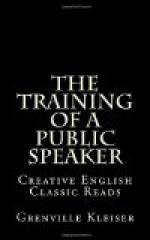3. Number
Numbers are nowhere so much lacking, nor so remarkable, as at the end of periods; first, because every sense has its bounds, and takes up a natural space, by which it is divided from the beginning of what follows: next, because the hearers following the flow of words, and drawn, as it were, down the current of the oration, are then more competent judges, when that impetuosity ceases and gives time for reflection. There should not, therefore, be anything harsh nor abrupt in that ending, which seems calculated for the respite and recreation of the mind and ear. This, too, is the resting-place of the oration, this the auditor expects, and here burst forth all his effusions of praise.
THE COMPOSITION OF PERIODS
The beginning of periods demands as much care as the closing of them, for here, also, the auditor is attentive. But it is easier to observe numbers in the beginning of periods, as they are not depending on, nor connected with, what went before. But the ending of periods, however graceful it may be in composition and numbers, will lose all its charm if we proceed to it by a harsh and precipitate beginning.
As to the composition of the middle parts of a period, care must be taken not only of their connection with each other, but also that they may not seem slow, nor long, nor, what is now a great vice, jump and start from being made up of many short syllables, and producing the same effect on the ear as the sounds from a child’s rattle. For as the ordering of the beginning and ending is of much importance, as often as the sense begins or ends; so in the middle, too, there is a sort of stress which slightly insists; as the feet of people running, which, tho they make no stop, yet leave a track. It is not only necessary to begin and end well the several members and articles, but the intermediate space, tho continued without respiration, ought also to retain a sort of composition, by reason of the insensible pauses that serve as so many degrees for pronunciation.
Cicero gives many names to the period, calling it a winding about, a circuit, a comprehension, continuation, and circumscription. It is of two kinds; the one simple when a single thought is drawn out into a considerable number of words; the other compound, consisting of members and articles which include several thoughts.
Wherever the orator has occasion to conduct himself severely, to press home, to act boldly and resolutely, he should speak by members and articles. This manner has vast power and efficacy in an oration. The composition is to adapt itself to the nature of things, therefore, even rough things being conceived in rough sounds and numbers, that the hearer may be made to enter into all the passions of the speaker. It would be advisable, for the most part, to make the narration in members; or if periods are used, they ought to be more loose and less elaborate than elsewhere. But I except such narrations as are calculated more for ornament than for giving information.




